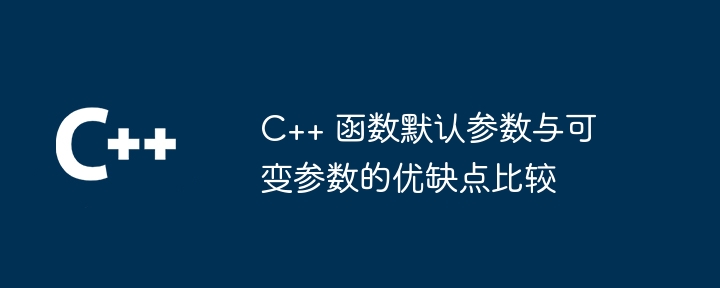Home >Backend Development >C++ >Comparison of the advantages and disadvantages of C++ function default parameters and variable parameters
Comparison of the advantages and disadvantages of C++ function default parameters and variable parameters
- PHPzOriginal
- 2024-04-21 10:21:01584browse
The advantages of default parameters in C functions include simplifying calls, enhancing readability, and avoiding errors. The disadvantages are limited flexibility and naming restrictions. Advantages of variadic parameters include unlimited flexibility and dynamic binding. Disadvantages include greater complexity, implicit type conversions, and difficulty in debugging.

Comparison of the advantages and disadvantages of C function default parameters and variable parameters
In C, functions can accept default parameters with default values or a variable number of variable parameters. These features provide flexibility, but also have their own pros and cons.
Default parameters
Advantages:
- Simplified function calls: You can provide only the required parameters by omitting the values of the default parameters.
- Enhance readability: By explicitly specifying default behavior, you can improve the readability of your code.
- Avoid mistakes: Using default parameters for non-required parameters prevents users from forgetting to provide them.
Disadvantages:
- Limited flexibility: Default value cannot be changed for all callers.
- Naming restrictions: Default parameter names must be unique, which may cause difficulties when having multiple overloaded functions.
Variable parameters
Advantages:
- Unlimited flexibility: allows the function to accept any number of parameters.
- Dynamic binding: The function can determine the number of parameters at runtime to achieve more general functionality.
Disadvantages:
- Higher complexity: Variable parameters increase the complexity of function implementation.
- Implicit type conversion: When passing values of different types, implicit type conversion is required, which may lead to type safety issues.
- Debugging difficulties: During debugging, determining the type and number of parameters can be difficult.
Practical Case
Consider the following function, which calculates the sum of all values in a sequence of numbers:
// 使用默认参数的函数
int sum(int a, int b = 0, int c = 0) {
return a + b + c;
}
// 使用可变参数的函数
int sum(int a, ...) {
va_list args;
va_start(args, a);
int sum = a;
int arg;
while ((arg = va_arg(args, int)) != 0) {
sum += arg;
}
va_end(args);
return sum;
}Example:
int result = sum(10); // 默认参数将 b 和 c 设置为 0 result = sum(10, 20); // 显式指定 b 的值,c 保持默认值 result = sum(10, 20, 30, 40); // 可变参数函数处理所有额外值
Conclusion
Default parameters and variadic parameters are both useful features in C, but it is important to consider their advantages and disadvantages when choosing. For non-required parameters that often remain unchanged, Default parameters provide simplicity and readability. For dynamic functions that need to accept any number of parameters, Variable parameters are a more flexible choice.
The above is the detailed content of Comparison of the advantages and disadvantages of C++ function default parameters and variable parameters. For more information, please follow other related articles on the PHP Chinese website!

